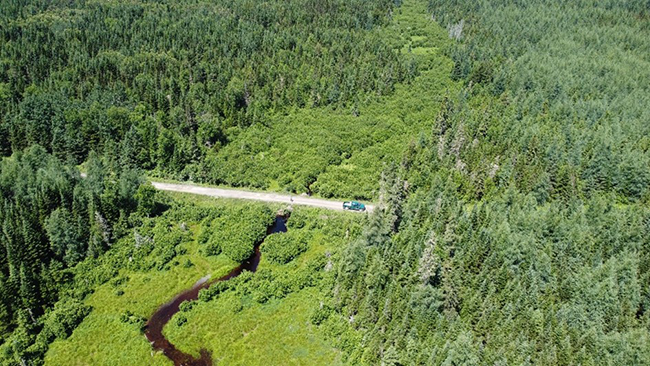DACF Home → Bureaus & Programs → Maine Forest Service → About Us → Message from the State Forester
Message from the State Forester
The Maine Forest Service (MFS) enjoys a long history of protecting Maine’s forests from wildfires, insect and disease outbreaks, poor forest practices and providing timely information to help foster informed decisions. These various MFS activities focus on having Maine’s forests more enjoyable, productive, healthy and well managed.

One of the most visible MFS activities is the prevention and suppression of forest fires. Some folks still remember the widespread devastation resulting from the fall 1947 fires, which brought about significant and positive change to the MFS that have continued over the ensuing decades. Through upgraded training, improved field communications and the reliance on an air fleet to knock down fires quickly, acreage lost to wildfires has been reduced to about 400 acres annually. This success is extraordinary in light of the significant reductions in manpower and expanded duties of the Rangers into regulating forest practices. Probably not well known, but a vital component of training, is the use of Maine’s Forest Rangers throughout the United States and Canada to fight fires.

An almost invisible war takes place each year between Maine’s forest and insects and diseases. Occasionally, insects or disease gets the upper hand and either forests or people are affected to the point where action must take place. Native pests, while at times expensive to deal with like the spruce budworm, don’t eliminate the host species like balsam fir which the budworm feeds on heavily. Exotic pests are a different story, for example, chestnut blight and Dutch elm disease eliminating the host species of American chestnut and American elm as significant components of the forest. Increasing world trade is intensifying the opportunity for invasive pests to become established in North America. We have several invasive insects right now either active in Maine’s forests or just “next door.” The hemlock woolly adelgid is causing damage to our coastal hemlocks while the very lethal emerald ash borer has footholds in both far northern and southern Maine; the Asian longhorned beetle is being fought in Worcester, Massachusetts and oak wilt is being addressed in several places in New York. The MFS is actively engaged in reducing the threats from pests using a number of different strategies. For those not having reached Maine, like the Asian longhorned beetle, efforts continue to slow its spread by restricting the flow of contaminated wood. For others like the hemlock woolly adelgid, damage is mitigated through efforts such as the release of biological control agents. Fortunately, the federal government is very active and lends significant assistance to states like Maine. In all cases, the involvement of the public is absolutely essential.

The MFS also has staff dedicated to assisting the public and landowners with forest related issues and education. Twelve District Foresters located across the state are available to help woodland owners make good choices about their land, including referring them to private sector professionals for more extensive assistance if needed. The MFS receives funding from several federal agencies to assist this work. For example, Project Canopy, Maine’s urban and community forestry program, provides grants to municipalities to develop management plans for their community woodlands. Some municipalities like Portland and Brunswick own significant woodlands in need of attention. Our Direct Link Loan program provides reduced-interest loans to help loggers purchase equipment and protect water quality.
Several years ago, the MFS took over the responsibility for conducting the federally funded forest inventory of Maine. This information is vital for public policy decisions and strategic decisions by members of the forest industry, particularly potential new investors in the Maine economy. The MFS is able to provide “customized” reports to meet specific requests and is frequently asked for such service.

MFS Foresters also review timber harvest activities to assess the implementation and effectiveness of efforts to protect water quality and other resources. We have found that woodland managers have really taken water quality protection to heart, with steadily improving performance during the decade since regular monitoring began.
Over the years, the MFS has taken on an increased role in forestry regulation. The introduction of the state’s forest practices rules and harvest notification requirements in 1991 were major factors in this changing role. Enforcement of timber theft and trespass laws still requires a good deal of time in spite of significant penalties. MFS’s regulatory philosophy is three-tiered: we seek to prevent violations from happening in the first place through education and outreach; we intervene where we see potential problems and help people comply; and, as a last resort, we take enforcement action. We believe this approach has contributed to a very positive trend towards increased land stewardship and regulatory compliance.

Combined, the services provided by the MFS contribute to the state’s economy. Trees not ravaged by disease or insects provide jobs from the stump to the mill. Stewardship advice and regulatory enforcement help support the recreational activities, and forests all Maine people can enjoy.
The MFS staff looks forward to assisting you. If we can be of service, please contact us.
Patty Cormier, Director
Maine Forest Service
Department of Agriculture, Conservation and Forestry
22 State House Station
Augusta, Maine 04333-0022
Telephone: (207) 287-2791
TTY Users Call Maine Relay 711
Contact the Maine Forest Service